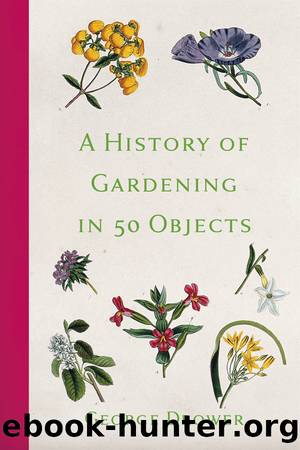A History of Gardening in 50 Objects by George Drower

Author:George Drower
Language: eng
Format: epub
Publisher: The History Press
TO ENHANCE GARDEN SOIL FERTILITY and keep pests down, throughout history a variety of ingeniously practical objects have been devised, some of which â in their time â were considered controversial. Organic gardeners today have Leonard Maskill to thank for disseminating an effective hand-picking method of removing slugs and snails. Prior to Maskillâs prolific writings, the technique had only been known of as a matter of folklore. Another elementary form of humane pest eradication was made common practice by Robert Sharrock, who could efficiently trap moles without the need for mechanical devices by the practical use of buried flowerpots. A magical paste, mixed by the Kingâs Head gardener William Forsyth, had been accepted as able to revive canker-suffering fruit trees at Kensington Palace; until, in a bitter feud with a horticultural rival, the miraculous healing plaster was uncovered as a fraud. The scandal was worsened by Forsyth having been lavishly rewarded for applying the bogus paste to oak trees used to build ships for the Royal Navy.
Columella, the Roman agriculturist whose sound advice on soil testing remains a useful guide for gardeners today, argued that soil fertility could be maintained by sensible composting. John Bennet Lawes, famous for establishing the renowned Rothamsted research centre, was an example of a garden pioneer who inadvertently damaged the environment. His superphosphate was effectively the worldâs first artificial fertiliser. Introduced in the early 1840s, it was advertised in The Gardenersâ Chronicle as a great boon for horticulturalists. However, the process of manufacturing the compound involved vast qualities of sulphuric acid â which had a grievous impact on the health of people living near Bennet Lawesâs Thames-side factories.
Download
This site does not store any files on its server. We only index and link to content provided by other sites. Please contact the content providers to delete copyright contents if any and email us, we'll remove relevant links or contents immediately.
| Africa | Americas |
| Arctic & Antarctica | Asia |
| Australia & Oceania | Europe |
| Middle East | Russia |
| United States | World |
| Ancient Civilizations | Military |
| Historical Study & Educational Resources |
The Dawn of Everything by David Graeber & David Wengrow(1685)
The Bomber Mafia by Malcolm Gladwell(1609)
Facing the Mountain by Daniel James Brown(1542)
Submerged Prehistory by Benjamin Jonathan; & Clive Bonsall & Catriona Pickard & Anders Fischer(1444)
Wandering in Strange Lands by Morgan Jerkins(1406)
Tip Top by Bill James(1400)
Driving While Brown: Sheriff Joe Arpaio Versus the Latino Resistance by Terry Greene Sterling & Jude Joffe-Block(1361)
Red Roulette : An Insider's Story of Wealth, Power, Corruption, and Vengeance in Today's China (9781982156176) by Shum Desmond(1343)
Evil Geniuses: The Unmaking of America: A Recent History by Kurt Andersen(1338)
The Way of Fire and Ice: The Living Tradition of Norse Paganism by Ryan Smith(1322)
American Kompromat by Craig Unger(1298)
It Was All a Lie by Stuart Stevens;(1291)
F*cking History by The Captain(1287)
American Dreams by Unknown(1277)
Treasure Islands: Tax Havens and the Men who Stole the World by Nicholas Shaxson(1251)
Evil Geniuses by Kurt Andersen(1246)
White House Inc. by Dan Alexander(1204)
The First Conspiracy by Brad Meltzer & Josh Mensch(1164)
The Fifteen Biggest Lies about the Economy: And Everything Else the Right Doesn't Want You to Know about Taxes, Jobs, and Corporate America by Joshua Holland(1111)
